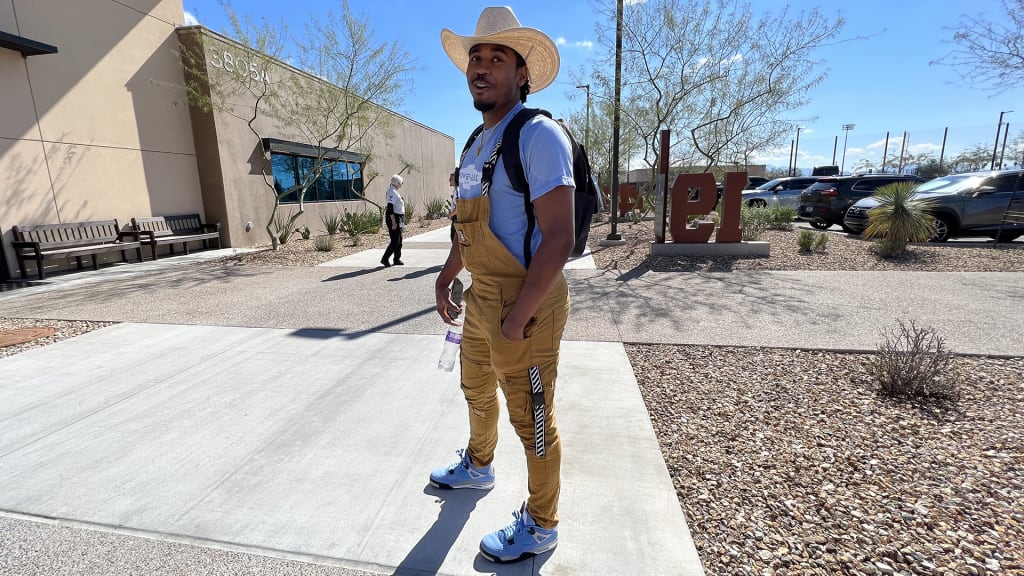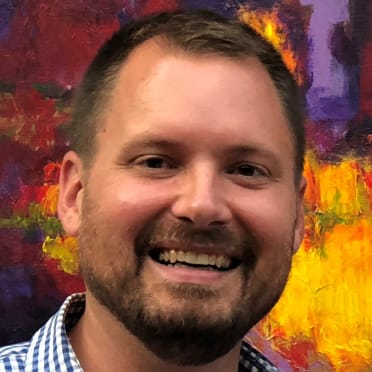PHOENIX -- Joe Gray Jr. recently held court for 22 entertaining minutes with a trio of Brewers beat reporters at American Family Fields of Phoenix. It could have gone on for hours.
Gray, an outfielder ranked No. 9 on MLB Pipeline’s list of the Brewers’ top prospects, talked diet, dealing with failure, African American representation in baseball and growing up riding sheep on his family farm in Mississippi. He also talked about his breakout in 2021, when Gray stayed healthy and delivered an .854 OPS, 20 home runs and 90 RBIs between Low-A Carolina and High-A Wisconsin to earn a spot in the prestigious Arizona Fall League.
The best way to get to know the 21-year-old is with his own words. So, with minor edits for length, here are highlights from Gray’s chat.
On being raised on a farm in Mississippi:
“I grew up in a small town outside of Hattiesburg named Carson. That’s where my family’s farmland has been for generations. Long story short, I grew up riding four-wheelers, being around horses, cows, throwing bales of hay, helping my dad move watermelons and stuff like that. There’s pictures of me on tractors with my grandparents, because that’s where they were. I hunt, fish -- that’s what I do. When I’m not playing baseball I like to shoot. I like to go to shooting ranges, I like to shoot for long range. I’m a big coyote hunter. I like deer hunting, but I’m a big coyote hunter. Coyote hunting and night hunting, that’s what I like to do, that’s what I grew up on.
“I went to school in the city and a lot of times kids my age -- especially at an inner-city school -- they get distracted by things that aren’t necessarily good for them and so for me, my distractions were nature. Hunting, things like that. When I wasn’t playing baseball, I wasn’t off partying or anything like that; I wanted to go hunting, I wanted to go shoot, I wanted to go ride four-wheelers. That was my peace of mind away from the sport. I’m going to stay that way.”
He really rode sheep?
“Mutton busting! When I was 6, 7, 8 years old, they used to call them 'Black Rodeos' down south. They’re all over now. But you’re a kid, you get all suited up and they tie you to the back of a sheep and you hold on for as long as you can. That’s what we grew up doing.
“Hey, look, I can hold on. I can hold on. But it was just for a few years, because my parents didn’t want me to get hurt. It was fun looking back at it.”

On choosing to focus on baseball:
“I used to get in trouble at school, only because I used to move around in class. I would never be able to sit in my seat for long. Baseball is actually my second sport. Football was my first sport. I didn’t start playing baseball until I was 10. Now, in today’s world, that’s actually late for a lot of kids. My mom came home one day and she was like, ‘Dawg, you’re getting in trouble too much in the springtime.’ So, one day she comes home with this flier and says, ‘We’re going to sign you up for baseball.’ After that, that was it. I just took off with baseball. Luckily in my neighborhood, we lived no more than 50 feet from a baseball park. My dad was a basketball player, but he learned baseball through teaching me. Basically me pulling him out there at 9 o’clock at night just to go hit.
“I played [football] up to my 10th-grade year. I’m not going to toot my own horn, but I feel like I was decent. But something happened with me and a coach there and I ended up choosing baseball, and I felt like that was the sport I needed to focus on, and that was it. I needed to do this, and this was me. Especially coming from the South, there’s not a lot of African American kids who are going to really get a chance in professional baseball in the South anyway. I was always somebody who liked to go against the opposition, so if I get counted out, it gives me more motivation.”
On struggles staying healthy during his first two professional seasons:
“You know, my first encounter was to beat pneumonia, and I lose 50 pounds. Come on now. Three weeks into pro ball. That's not something normal. And then the next year, I finally get back on the field and I have a blown-out hamstring and that's on and off, on and off, and having to deal with it. You try not to focus on the stuff you see online, the critics and things like that. Because as a player, you know who you are. I know what I can do, but I can't do much if I'm coming on and off the field. …
“And in the next year [2020], I felt like I did everything I needed to do to get back on the field. I had a good start to the spring, then bam, COVID. We had got sent home on my birthday. So that was a horrible birthday present, March 12. So, hey, the first three years were a challenge. But I'm here. And finally I got to be on the field [in 2021]. I stayed on the field for a full year. And that was my focus. So long as I'm on the field, stuff is going to happen. And that's just what it is. I believe in my ability. I’ve just got [to] stay on the field, let it all play out.
“Now of course, there were times where I started to doubt myself. That's one good thing that I definitely want to give thanks to some of the coaches here at the Brewers. They were constantly in my ear letting me know, 'Look, man, all you need to do is get on the field.' It’s hard coming out of high school, a guy who had never been hurt, never been sick, and have those first three years be what it was. It's hard to keep your motivation going. But they stayed in my ear. They stayed on my corner, they let me know, ‘All you need to do is focus on staying on the field.’ And, then, bam. It happened how it happened. That's going to be my focus this next year, staying on the field [and] keeping my body healthy."
More on that bout with walking pneumonia in his first year of pro ball:
"I lost 50 pounds. I went from 195 to I think it was 147. At first we thought it was Valley Fever. The first two weeks, I couldn't breathe in a hotel room. After the second week I'm looking in the mirror every day I wake up, and those shirts I was filling out started feeling like two-XL. At night, I had to start sleeping in the bathtub. I had to put towels under the door and then steam up the bathroom as hot as I can, and I would literally fall asleep in the bathtub. That's the only way I could breathe at night.
“Finally, one day, I finally went to the doctor and I had like a 105 [degree] fever. Crazy, almost like brain dead. It was bad. But, yeah, found out it was walking pneumonia, and lost all that weight. It is what it is. But it was weird because I honestly thought I was OK. … I'll walk around playing the whole time and feeling like crap, but I thought it was just like something that just was going to go away, you know? I'd never been sick. I didn't know how that felt.
“That happened like the second week I got into pro ball, and then I played for roughly 20 games total out of a 60-game season they had in the [Arizona Complex League]. Then finally I came back the last five games. So, think about it: In the first two years in pro ball, I didn’t have more than maybe 50 games under my belt. Everyone else, they got 100, 160. I was definitely behind. The only thing I needed was at-bats. That’s the only thing I needed. Let my eyes see the ball.”
On Joey Wiemer beating him for 2021 Brewers Minor League Player of the Year:
“You want people to push you, and that’s what he does. Me and him, when he needed a wake-up call during the season, I woke him up, because you know how I am. And when I needed one, he woke me up. That’s how close we are when it comes to being teammates and friends. You can’t make that relationship up because there’s things that we do in the outfield that we don’t necessarily have to talk about.”
On the possibility of starting this season with Double-A Biloxi:
“That’s my goal. It’s Biloxi for me. Now, that’s not my decision at the end of the day, but it’s up to me to make that decision hard for them. If I do what I’m supposed to do and play how I’m supposed to play and show them that I’m ready, then it’s going to be a hard decision on them. My goal is to be in Biloxi. As a player, I have to take care of my performance on the field first. That’s my expectation for that.
“That’s going to mean a lot [to play in my home state]. It’s going to mean a lot for my family, for my school, even the state. I plan on increasing the ticket sales there if we can. It’s just because my community back home, they support me. They’re behind me a lot and they would love to see me play, because a lot of people haven’t seen me play in years. That would be something, that would certainly be a milestone. The real goal is to get to the big leagues, and Biloxi is just a stop.”
